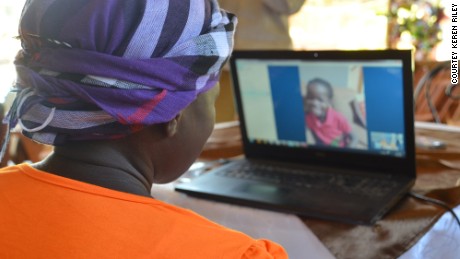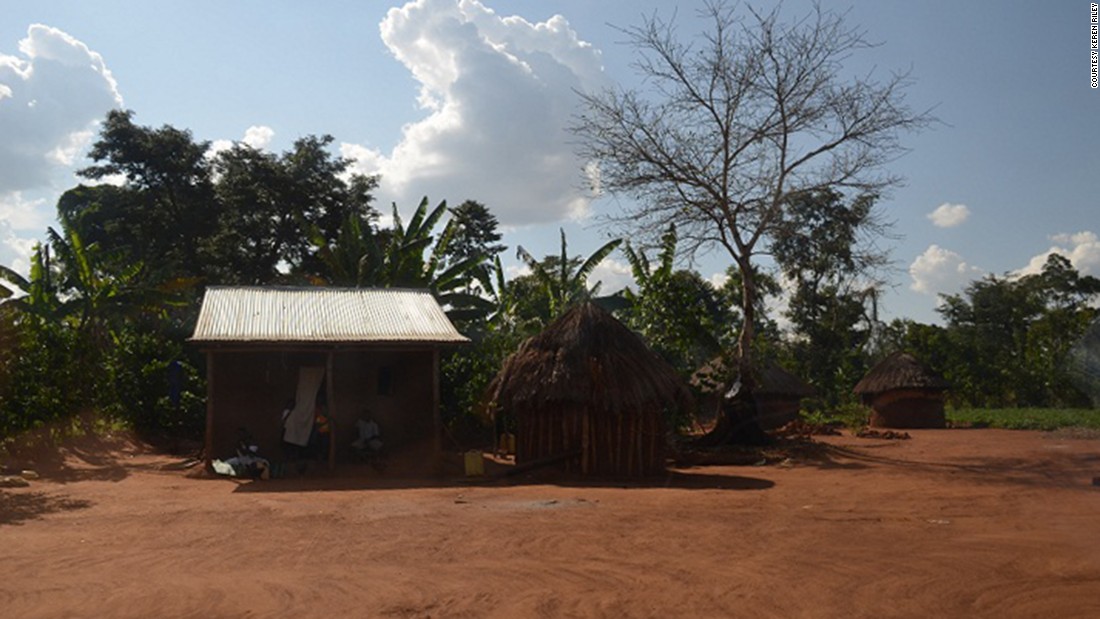They adopted her thinking she was abandoned. Then they learned the truth.
The 7-year-old girl, dressed in bright pink and holding one of her favorite stuffed animals, sees her mother for the first time in nearly a year. A brilliant smile spreads across Namata's face, punctuating her excitement.
She and her mother are speaking via Skype more than 7,400 miles apart. Namata, or Mata as she's known, talks from the home of her adoptive parents in Ohio. Her mother watches via a laptop in Uganda, in a quiet spot away from her village.
"Hello," Mata says. "How are you doing?"
Her mother laughs. She's in awe of laying eyes on the daughter she thought she'd lost forever. Mom holds a newborn, and Mata says she wants a closer look at her sister. Her mother stands and lifts the baby, cradling her over the computer screen.
Mata beams, as does her adoptive mom, Jessica Davis.
As the conversation continues, Mata wants answers. She wants to know why her mother gave her away.
By the time the call ends, Mata's radiant smile has turned to sobs. "My mom was tricked," she says. "My mom was tricked."
Her mother told her it was never her intent to give Mata up for good -- that she'd been deceived. She had been told that Mata would be given a great educational opportunity if she was sent away but that she would one day return. That Mom would always be a part of her daughter's life.
For Mata's adoptive mother, the revelation was earth-shattering. Devastating. Traumatizing. Every possible emotion rolled into one.
It also confirmed a gut feeling: that something was amiss about the story the Ohio-based adoption agency had told Jessica and her husband, Adam, about Mata's background. The agency, European Adoption Consultants, told them that Mata's father had died and that her mother neglected her and couldn't afford to feed her. The paperwork said Mata had never attended school.
But in the months after she arrived in America, as Mata's command of English improved, she spoke glowingly about her mother. How they cooked together, how they went to church together and how her mother walked with her to school.
The Skype conversation, on August 29, 2016, confirmed Jessica's suspicions. As she absorbed the news, Jessica realized that she didn't participate in an adoption at all but had unwittingly "participated in taking a child from a loving family."
And she knew what she had to do: return Mata to her mother.
'Pull the wool over their eyes'
The Davises shared their story exclusively with CNN, saying they believe that Ugandan children like Mata are being trafficked, with American families not knowing the real stories behind their adoptions.
An investigation by CNN into this alleged trafficking scheme found that children are being taken from their homes in Uganda on the promise of better schooling, placed into orphanages even though they aren't orphans, and sold for as much as $15,000 each to unsuspecting American families. CNN's investigation discovered that multiple families were duped this way.
Keren Riley of Reunite Uganda, a grass-roots organization that helps return trafficked children to their birth mothers, says facilitators on the ground prey on vulnerable moms, often widows, promising educational opportunities for their children.
The traffickers, she says, can include police and lawyers, teachers and local leaders. Complicating matters, there is no word for "adoption" in the language many Ugandan villagers speak, Riley says, so mothers are easily deceived.
"It's easy to pull the wool over their eyes," says Riley, who arranged the video reunion between Mata and her birth mother. Traffickers "know when somebody has lost a husband in a tragic way and is vulnerable and is not coping -- and then they get flagged."
That's exactly what happened in Mata's village, Riley says: A villager-turned-trafficker made a pitch at a local church and managed to get seven children into the adoption circuit, including Mata, who was sent to a place called God's Mercy, about a four-hour drive away. That's where the Davises met her: "She was at an orphanage. No toys. Bars on the windows," Jessica said.
According to an affidavit obtained by CNN, Mata's mother ultimately told a Ugandan family court that she was grief-stricken after her husband died in a vehicle accident March 28, 2014, and was told about a way to get Mata a good education.
"I had not realized that I had gone through a process to take away my parental rights completely," the mother said in sworn testimony September 8, 2016. "I had all along thought and understood that the child was going to be educated and returned back to me."
But the original orphan referral form that sent Mata to God's Mercy painted a different picture, saying the mother was "helpless" and "can't provide basic needs of the child for better growth."
The referral form is dated October 21, 2014 -- exactly one week after the Davises say they got a call from European Adoption Consultants telling them Mata was available for adoption.
At the time of that call, the Davises now believe, Mata wasn't an orphan at all but was still living at home with a mother who loved her. They believe she was pulled from her home and placed in the orphanage after the adoption agency found an American couple -- buyers, in a sense -- with money to adopt a child.
The Ugandan government would later determine that Mata's mother had been deceived, with a Ugandan court finding that the referral form had been forged and wasn't actually signed by Ugandan police.









0 Comments:
Post a Comment
Thank you for your comments
Subscribe to Post Comments [Atom]
<< Home